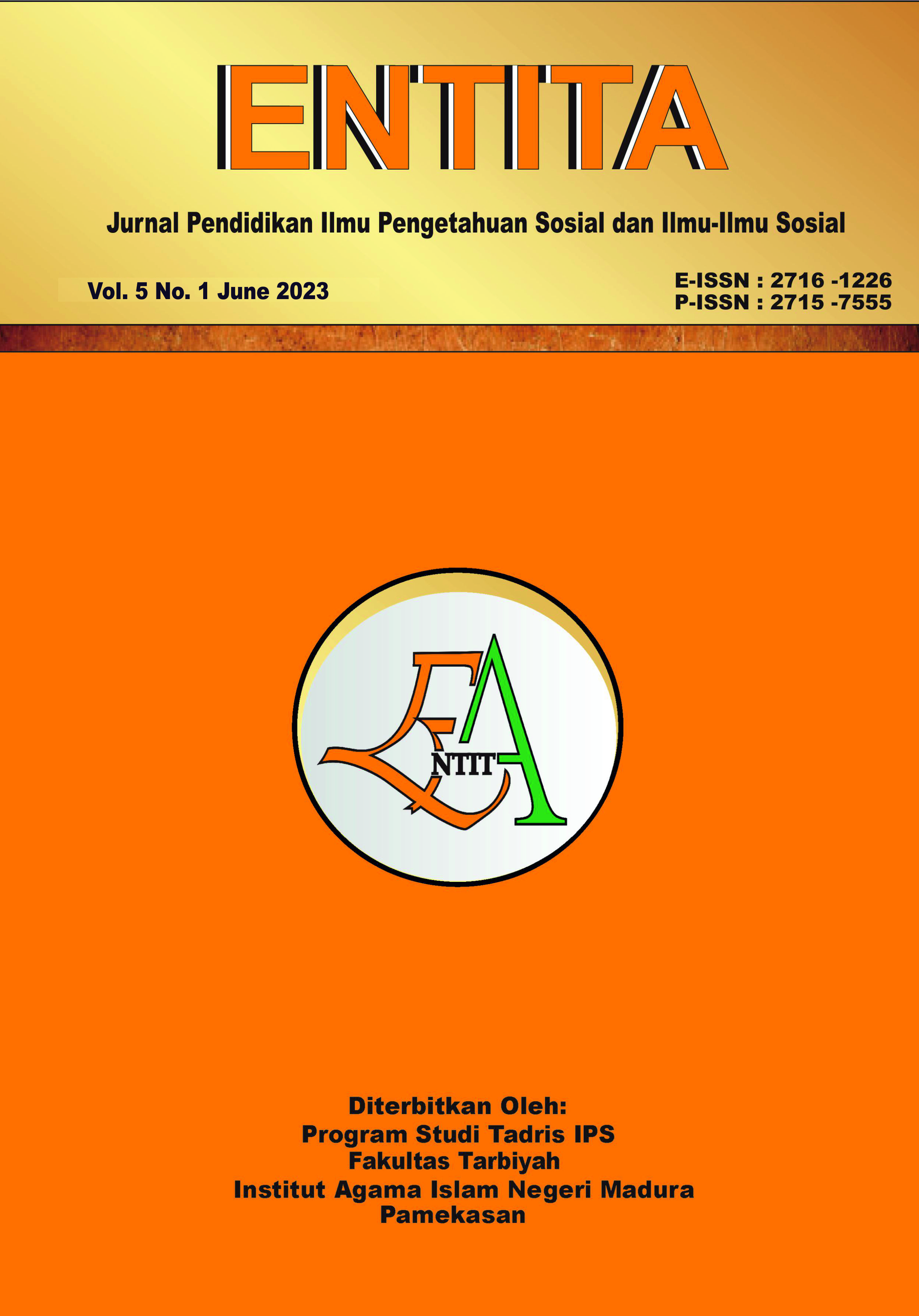Eco pedagogic Based on Local Wisdom as an Effort to Grow Students’ Ecological Awareness
 Abstract views: 336
,
Abstract views: 336
,
 pdf downloads: 333
pdf downloads: 333
Abstract
Ecological awareness is an awareness that is important for someone to have as an effort to solve the problem of environmental crisis. This study aims to determine the portrait of students’ ecological awareness, the use of eco-pedagogy based on local wisdom to foster students’ ecological awareness, and the challenges faced by teachers in growing students’ ecological awareness. This research is a qualitative research conducted at SDN 16 Sayowang. Informants are school principals, teachers, staff, and students selected by purposive sampling. To obtain data interviewed, observation, and documentation. The validity of the data was obtained through triangulation of theories, methods, and sources. Next, the data is analyzed. This study found that the portrait of students’ ecological awareness can be seen from the ability to distinguish between organic and inorganic waste. Using local wisdom-based eco-pedagogy is carried out by utilizing school culture and through the learning process. The teacher takes as an example the traditions carried out by the local community and are related to the value of loving the environment, such as the appadekko tradition. To raise ecological awareness, it cannot be separated from the challenges faced by teachers, namely students who have diverse family backgrounds, students who have a diversity of characteristics and learning styles, as well as the influence of student association in society. The findings of this study can be an example of the use of local wisdom in instilling the value of loving the environment in students.
Downloads
References
Amir, R., & Marzuki, K. (2021). Membangun karakter bangsa melalui kegiatan tradisi appadekko. INOVASI: Jurnal Hasil Pengabdian Masyarakat, 1(1), 17–25. https://scholar.google.com/citations?view_op=view_citation&hl=en&user=7Jr6ZXEAAAAJ&pagesize=100&citation_for_view=7Jr6ZXEAAAAJ:W7OEmFMy1HYC
Bouley, T. M. (2012). Ecological intelligence and environmental education: My journey. Science Education Review, 11(1), 18–24. https://search.ebscohost.com/login.aspx?direct=true&db=eric&AN=EJ977378&%0Alang=fr&site=ehost-live%0Ahttp://www.scienceeducationreview.com/
Chan, F., Rimba Kurniawan, A., Oktavia, A., Citra Dewi, L., Sari, A., Putri Khairadi, A., & Piolita, S. (2019). Gerakan Peduli Lingkungan Di Sekolah Dasar. Adi Widya: Jurnal Pendidikan Dasar, 4(2), 190. https://doi.org/10.25078/aw.v4i2.1126
Creswell, J. W. (2013). Qualitative inquiry and research design. SAGE Publication.
Finali, Z., Putu, L., & Budyawati, I. (2022). Ekopedagogik dalam pembelajaran di sekolah dasar sebagai pendukung penguatan pendidikan karakter bangsa. 16, 243–249. https://doi.org/10.19184/jpe.v16i2.33922
Gabriella, D. A., & Sugiarto, A. (2020). Kesadaran dan perilaku ramah lingkungan mahasiswa di kampus. Jurnal Ilmu Sosial Dan Humaniora, 9(2), 260. https://doi.org/10.23887/jish-undiksha.v9i2.21061
Herdiansyah, H., Sukmana, H., & Lestarini, R. (2019). Eco-Pesantren as A Basic Forming of Environmental Moral and Theology. Kalam, 12(2), 303–326. https://doi.org/10.24042/klm.v12i2.2834
Jufri, Fua, J. La, & Nurlia, R. U. (2018). Pendidikan lingkungan di sekolah dasar negeri 1 baruga kota kendari. Jurnal At-Ta"dib, 11(2), 164–181.
Kariadi, D., Maryani, E., Sjamsuddin, H., & Ruhimat, M. (2019). Penggunaan awik-awik sebagai model ecopedagogy dalam pembelajaran ips. Jurnal PIPSI (Jurnal Pendidikan IPS Indonesia), 4(2), 37. https://doi.org/10.26737/jpipsi.v4i2.1285
Kencanasari, R. A. V., Surahman, U., & Permana, A. Y. (2019). The instrumental framework to measuring environmental awareness. Innovation of Vocational Technology Education, 15(2), 101. https://doi.org/10.17509/invotec.v15i2.19638
Kos, M., Jerman, J., Anžlovar, U., & Torkar, G. (2016). Preschool children’s understanding of pro-environmental behaviours: Is it too hard for them? International Journal of Environmental and Science Education, 11(12), 5554–5571.
Palupi, T., & Sawitri, D. R. (2018). The importance of pro-environmental behavior in adolescent. E3S Web of Conferences, 31, 2–5. https://doi.org/10.1051/e3sconf/20183109031
Putri, D. K., Setiawan, I., & Astari, A. J. (2021). Environmental care behavior from knowledge and social environment factors in Pasaman Barat District. 2020, 23575–23584.
Setiardi, D. (2017). Keluarga sebagai sumber pendidikan karakter bagi anak. Tarbawi : Jurnal Pendidikan Islam, 14(2). https://doi.org/10.34001/tarbawi.v14i2.619
Subianto, J. (2013). Peran keluarga, sekolah, dan masyarakat dalam pembentukan karakter yang berkualitas. Edukasia : Jurnal Penelitian Pendidikan Islam, 8(2), 331–354. https://doi.org/10.21043/edukasia.v8i2.757
Wati, E. S., & Listiana, A. (2020). Ecopedagogics: What is the appropriate content in teaching children about environmental care in the globalization era. Jurnal Lentera, Kajian Keagaaan, Kelilmuwan Dan Teknologi, 5(1), 1–16.
Yasida, K. S. (2020). Eco- Pedagogy. Historika, 23(1), 70–79.
Yunansah, H., & Herlambang, Y. T. (2017). Pendidikan berbasis ekopedagogik dalam menumbuhkan kesadaran ekologis dan mengembangkan karakter siswa sekolah dasar. EduHumaniora | Jurnal Pendidikan Dasar Kampus Cibiru, 9(1), 27. https://doi.org/10.17509/eh.v9i1.6153
Zahrawati, F. (2021). Ekologi sosial berbasis riset: Upaya membangun kesadaran ekologis. IAIN Parepare Nusantara Press.
Copyright (c) 2023 ENTITA: Jurnal Pendidikan Ilmu Pengetahuan Sosial dan Ilmu-Ilmu Sosial

This work is licensed under a Creative Commons Attribution-NonCommercial 4.0 International License.
ENTITA: Jurnal Pendidikan Ilmu Pengetahuan Sosial dan Ilmu-Ilmu Sosial operates an Open Access policy under a Creative Commons Non-Commercial 4.0 International license. Authors who publish with this journal agree to the following terms:
- The copyright of the received article once accepted for publication shall be assigned to the journal as the publisher with licensed under a

- Journal is able to enter into separate, additional contractual arrangements for the non-exclusive distribution of the journal's published version of the work (e.g., post it to an institutional repository or publish it in a book), with an acknowledgement of its initial publication in this journal.
- Journal is permitted and encouraged to post their work online (e.g., in institutional repositories or on their website) prior to and during the submission process, as it can lead to productive exchanges, as well as earlier and greater citation of published work (see The Effect of Open Access).
- Here is Copyright Transfer Form that author can download and send to OJS during submission.

















